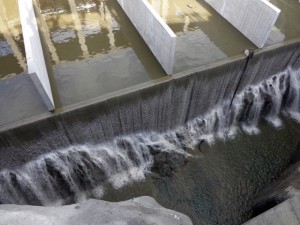
$1 billion in projects in northwest B.C. have support of First Nations
A billion dollars worth of run-of-the-river projects are nearing completion in northwest B.C. that will produce enough electricity to power nearly 100,000 homes or a large industrial project.
AltaGas’s $700-million Forrest Kerr project is being tested now and will begin producing power to the BC Hydro grid when the new Northwest Transmission line is complete.
The power line is in the final stages of construction, but BC Hydro officials said Wednesday they do not have a completion date. Earlier, BC Hydro said power line was expected to be finished by the end of May.
AltaGas’s smaller Volcano Creek project is also expected to be ready this year, while the McLymont Creek project is scheduled to come on line next year.
“We hope to be operating this summer if all goes well. It’s exciting. It’s a significant project and a significant amount of power,” AltaGas vice-president Dan Woznow said, referring to the Forrest Kerr project.
The Forrest Kerr project redirects a portion of the Iskut River through a three-kilometre, 10-metre diameter tunnel to a power house containing the power turbines.
A 350-person camp has been in place in the remote area off the province off Highway 37 for several years to build the projects.
The trio of run-of-the-river projects will produce a maximum of 277 megawatts of electricity for the BC Hydro grid.
The projects are a sign of the kind of development that is taking place even before the $740-million Northwest Transmission Line is completed. Once the line is finished it is expected to spark even more development, particularly in mining projects.
A Mining Association of B.C. study projected that providing power along the Highway 37 corridor — also known as the Stewart-Cassiar Highway — would bring $15 billion of investment if 11 mines were built.
So far, just one mine, Imperial Metal’s $500-million Red Chris gold and copper mine, is under construction. The company is also building a 95-kilometre extension to the 344-kilometre Northwest power line.
The massive Galore Creek gold-silver-copper project was put on hold several years ago.
Another key to opening up development along the Highway 37 corridor has been reaching agreements with First Nations.
AltaGas has impact-benefits agreements with the Tahltan, which provide revenue-sharing as well as employment opportunities.
And the B.C. government has signed revenue-sharing agreements with the Tahltan.
An agreement signed this week for the McLymont and Volcano projects will provide the Tahltan with about $280,000 in annual revenues.
Last year, a revenue deal signed with the province for the larger Forrest Kerr project will provide the Tahltan with about $2.5 million each year.
The B.C. government and industry have started to be more proactive in providing benefits to First Nations in British Columbia for industrial projects on their traditional territory.
First Nations hold unresolved aboriginal claim to large areas of land in B.C., and the Canadian courts have said that First Nations have to be consulted and accommodated where appropriate.
The Tahltan’s traditional territory covers an area in northwest B.C. about three times the size of Vancouver Island.
“It’s integral to our people to have these revenue-sharing agreements because we are receiving a benefit from development in our lands,” said Tahltan president Annita McPhee.
The province also provided this week $550,000 to support the Tahltan Socio-Cultural Working Group, meant to address challenges to the First Nation that come with development.
McPhee noted those problems can include drug and alcohol use and increased population that puts strains on their schools, health services and adds more traffic to Highway 37.
“Honestly, we don’t want to end up like Fort McMurray,” she said, referring to the oilsands-fed economy that has put pressure on community services and caused the price of rent and housing to skyrocket.
Despite acceptance of industrial development on its traditional territory, the Tahltan have not given carte blanche to that development.
They are opposed to the Fortune Minerals coal project and to coal-bed methane development. The Tahltan celebrated when Shell Canada recently gave up its coal bed methane tenures in their traditional territory, said McPhee.
“We are not opposed to development, but we want to ensure the benefits far outweigh the impacts, and there is some projects in our territory where the impacts are just too great,” said McPhee.
Read more: http://www.vancouversun.com/river+projects+soon+provide+power+grid/9816846/story.html#ixzz31WpsHbMG
